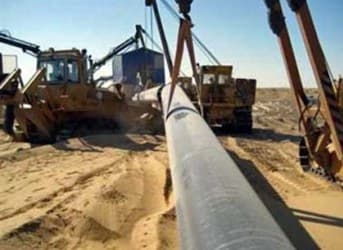Those concerned with European energy are excited for the arrival of finalized plans for the Southern Gas Corridor that will carry natural gas from Azerbaijan, through Turkey, Albania, Greece to Italy. The Trans-Adriatic Pipeline (TAP), a project of Norwegian Statoil, Swiss Axpo and German E.ON Ruhrgas is due for completion in 2019 and lauded as a way to reduce Europe’s dependency on Russian reserves. As European demand for energy grows, many Europeans fear falling vulnerable to Russian supply manipulations will have negative economic and political implications in the future.
A wide variety of energy security concerns, however, underscore the need for the TAP. The fear of falling vulnerable to Russian supply manipulation is the main worry, however rapidly increasing global demand, competition for energy resources, chronic instability in the energy producing Middle East and an emerging need to diversify energy use to address climate change all factor into Europe’s emphasis on energy security.
Russia currently accounts for 23 percent of Europe’s gas supply, however with Europe’s natural gas consumption projected to grow almost 20 percent by 2020, the E.U. is aggressively pursuing ways to diversify its gas supply.
Related article: Welcome the New Trans-Adriatic Pipeline Consortium
Russia has naturally sought to protect its privileged role as a major provider of energy by raising concerns over the construction of pipelines out of Central Asia, and co-opting European and Central Asian companies for alternative pipeline plans. In a major breakthrough, however, Azerbaijan appears to have resisted Russian efforts to stifle gas movement out of the Caspian Sea.
The pipeline is initially expected to carry 10 billion cubic meters (bcm) with plans to expand supply to 20 bcm. While this provides Europe only a small fraction of overall supply, the TAP’s real significance has more to do with the fact that gas from the Caspian Sea is now available independently of Russia’s Gazprom.
This Southern Corridor is designed to account for future gas supplies in Azerbaijan and Turkmenistan. As supplies increase, prices will be dictated more so by market principles than Gazprom’s monopoly. In addition, countries hosting the TAP, including Turkey, Greece, and Albania, are expected to benefit from the pipeline.
Greece will receive an estimated 1.5 billion EUR and create an estimated 2,700 jobs from construction of the TAP alone. Yorgo K?rbaki of Turkey’s Hürriyet newspaper reported in late June that in the next 50 years, Greece is expected to earn around 35 billion EUR, including 5 billion in net profit, from the project.
The other winners, of course, include the South Caucuses. By anchoring Azerbaijan to the European community, the TAP could help to stabilize a region facing major security concerns and governance failures.
Russia’s occupation of two “independent” enclaves in Georgia heightens regional tensions, and the political leaders in Azerbaijan and Armenia remain unflinchingly autocratic. Stronger ties with Europe, however, could result in positive change. The E.U. has much to offer the region in exchange for political and economic reform.
Related article: Trucks, Trains, or Pipelines – The Best Way to Transport Petroleum
Moreover, the TAP will arguably benefit the region’s most important geostrategic power: Turkey. In addition to the expected $8 billion in investments to local companies the TAP is expected to provide, the influx of natural gas is bound to wean Turkey away from its energy dependence on Russia and Iran, while strengthening its already solid ties with Europe.
A Turkey less connected to Russia and Iran is better positioned to serve as an essential Western ally moving forward. Cheaper gas as a result of the TAP will also cut into Turkey’s current account deficit, thereby facilitating its strong economic momentum.
TAP, in the long-term, could alter regional dynamics by diversifying European energy supplies, eroding Russia’s monopoly, stabilizing the South Caucuses and providing a boost to regional economies by way of investment and cheaper energy. The project should heavily benefit Europe, Turkey and the South Caucuses, leaving Russia to aggressively pursue alternative markets.
By. Eli Lovely


















